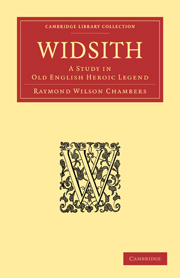Book contents
- Frontmatter
- PREFACE
- Contents
- CORRECTIONS AND ADDITIONAL NOTES
- CHAP. I WIDSITH AND THE GERMAN HEROIC AGE
- CHAP. II THE STORIES KNOWN TO WIDSITH: GOTHIC AND BURGUNDIAN HEROES
- CHAP. III THE STORIES KNOWN TO WIDSITH: TALES OF THE SEA-FOLK, OF THE FRANKS AND OF THE LOMBARDS
- CHAP. IV WIDSITH AND THE CRITICS
- CHAP. V THE GEOGRAPHY OF WIDSITH
- CHAP. VI THE LANGUAGE AND METRE OF WIDSITH
- CHAP. VII SUMMARY AND CONCLUSION
- TEXT OF WIDSITH, WITH NOTES
- APPENDIX
- MAPS AND INDEX
CHAP. II - THE STORIES KNOWN TO WIDSITH: GOTHIC AND BURGUNDIAN HEROES
Published online by Cambridge University Press: 16 May 2011
- Frontmatter
- PREFACE
- Contents
- CORRECTIONS AND ADDITIONAL NOTES
- CHAP. I WIDSITH AND THE GERMAN HEROIC AGE
- CHAP. II THE STORIES KNOWN TO WIDSITH: GOTHIC AND BURGUNDIAN HEROES
- CHAP. III THE STORIES KNOWN TO WIDSITH: TALES OF THE SEA-FOLK, OF THE FRANKS AND OF THE LOMBARDS
- CHAP. IV WIDSITH AND THE CRITICS
- CHAP. V THE GEOGRAPHY OF WIDSITH
- CHAP. VI THE LANGUAGE AND METRE OF WIDSITH
- CHAP. VII SUMMARY AND CONCLUSION
- TEXT OF WIDSITH, WITH NOTES
- APPENDIX
- MAPS AND INDEX
Summary
The beginnings of Heroic Song in Germany
Tacitus mentions the ancient songs in which the Germans celebrated Tuisco, the earth-sprung god, and his son Mannus, the authors and founders of their race. Whether these poems were narrative or choric we do not know. That not gods alone but also historical and semi-historical heroes were commemorated, is proved however by the further remark of Tacitus concerning the old poems “quod unum apud illos memoriæ et annalium genus est.” One other precious scrap of information Tacitus has preserved. When making his last mention of Arminius, and telling how Tiberius refused to compass by poison the death of the enemy of the Roman people, he sums up thus the further history of the liberator of Germany: “dolo propinquorum cecidit…septem et triginta annos vitæ, duodecim potentiæ explevit, caniturque adhuc barbaras apud gentes.”
It is not strange that this notice of a chief, cut off in the flower of his age by the treachery of those closest to him, has reminded modern critics of the story of Sigurd the Volsung, and that some have seen in the story of Sigurd's death by the wiles of his sworn brethren the last traditional echo of this treacherous onslaught upon Arminius, and of the songs in which his deeds and his death were celebrated. No evidence however is forthcoming to support such a theory, and there is much which tells directly against it.
- Type
- Chapter
- Information
- WidsithA Study in Old English Heroic Legend, pp. 12 - 65Publisher: Cambridge University PressPrint publication year: 2010First published in: 1912

